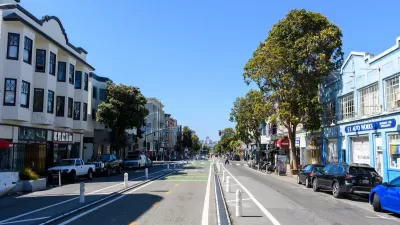One vocal San Francisco man has halted progress on the city's expansive bicycle master plan, claiming that the more space allotted to bicycles, the more traffic congestion -- and greenhouse gas emissions -- there will be.
"At a time when most other cities are encouraging biking as green transport, the 65-year-old local gadfly has stymied cycling-support efforts here by arguing that urban bicycle boosting could actually be bad for the environment. That's put the brakes on everything from new bike lanes to bike racks while the city works on an environmental-impact report."
"Mr. Anderson disagrees. Cars always will vastly outnumber bikes, he reasons, so allotting more street space to cyclists could cause more traffic jams, more idling and more pollution. Mr. Anderson says the city has been blinded by political correctness. It's an "attempt by the anti-car fanatics to screw up our traffic on behalf of the bicycle fantasy," he wrote in his blog this month."
"Unveiled in 2004, the 527-page document was filled with maps, traffic analyses and a list of roughly 240 locations where the city hoped to make cycling easier. The plan called for more bike lanes, better bike parking and a boost in cycling to 10% of the city's total trips by 2010."
"In November 2006, a California Superior Court judge rejected San Francisco's contention that it didn't need an environmental review and ordered San Francisco to stop all bike-plan activity until it completed the review."
"Since then, San Francisco has pedaled very slowly. City planners say they're being extra careful with their environmental study, in hopes that Mr. Anderson and Ms. Miles won't challenge it. Planners don't expect the study will be done for another year."
FULL STORY: San Francisco Ponders: Could Bike Lanes Cause Pollution?

Planetizen Federal Action Tracker
A weekly monitor of how Trump’s orders and actions are impacting planners and planning in America.

Maui's Vacation Rental Debate Turns Ugly
Verbal attacks, misinformation campaigns and fistfights plague a high-stakes debate to convert thousands of vacation rentals into long-term housing.

Restaurant Patios Were a Pandemic Win — Why Were They so Hard to Keep?
Social distancing requirements and changes in travel patterns prompted cities to pilot new uses for street and sidewalk space. Then it got complicated.

In California Battle of Housing vs. Environment, Housing Just Won
A new state law significantly limits the power of CEQA, an environmental review law that served as a powerful tool for blocking new development.

Boulder Eliminates Parking Minimums Citywide
Officials estimate the cost of building a single underground parking space at up to $100,000.

Orange County, Florida Adopts Largest US “Sprawl Repair” Code
The ‘Orange Code’ seeks to rectify decades of sprawl-inducing, car-oriented development.
Urban Design for Planners 1: Software Tools
This six-course series explores essential urban design concepts using open source software and equips planners with the tools they need to participate fully in the urban design process.
Planning for Universal Design
Learn the tools for implementing Universal Design in planning regulations.
Heyer Gruel & Associates PA
JM Goldson LLC
Custer County Colorado
City of Camden Redevelopment Agency
City of Astoria
Transportation Research & Education Center (TREC) at Portland State University
Jefferson Parish Government
Camden Redevelopment Agency
City of Claremont





























